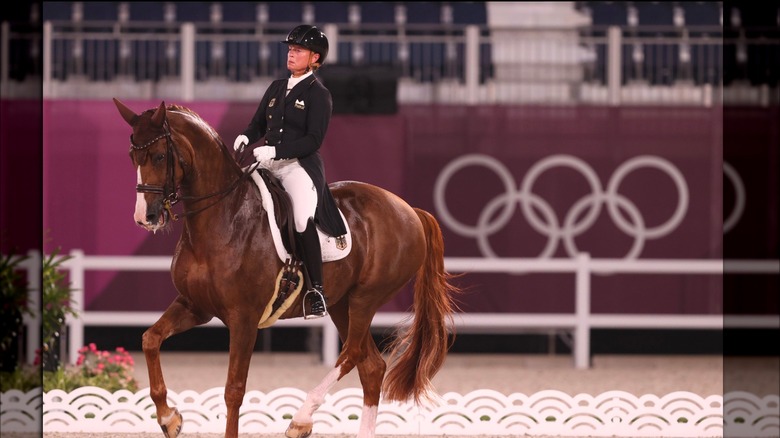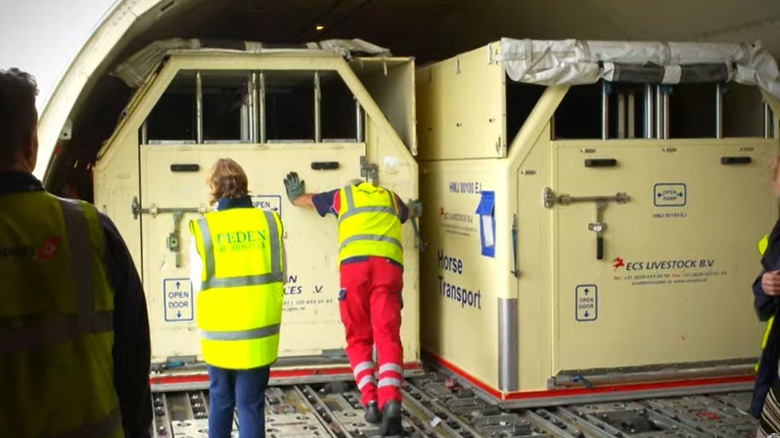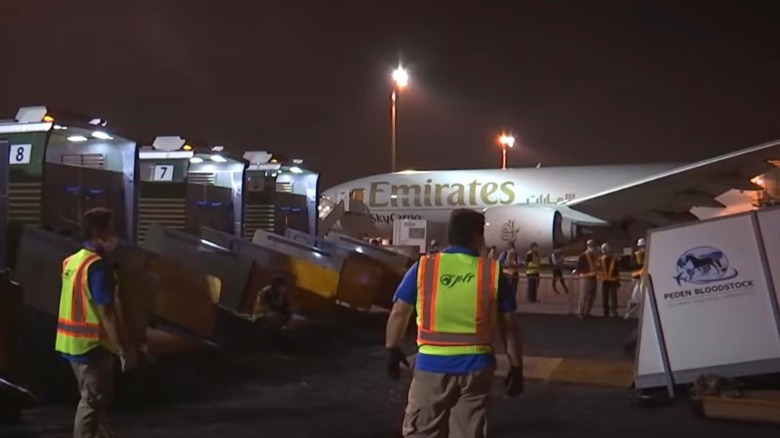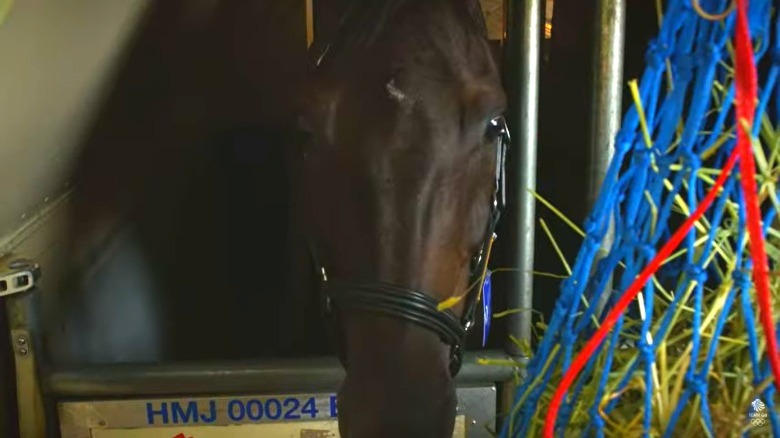Here's How Equestrian Horses Really Get To The Olympics
In the equestrian world, the relationship between horse and rider is a symbiotic one, a carefully balanced, nuanced understanding. One horse cannot be easily replaced for another. And while a lot of us have seen horses being carted around in trailers on the road, rarely do we think about how horses are transported to overseas competitions like the Olympics. With over 300 horses participating in the Tokyo 2020 Olympics from all over the world, it begs the question: how do the animals actually get there (via USA Today)?
While it might be hard to imagine, horses are actually transported to international competition events like the Olympics on freight cargo planes. Each horse is loaded into a special stall on the tarmac, then those stalls are wheeled to the plane, lifted up, and loaded onto the open cargo deck of the plane. Most cargo planes can hold anywhere from 50-80 horses per flight. The flights aren't cheap, though, with Horse Racing Sense noting that flying a horse can cost anywhere from $8,000 to $30,000 — or more — depending on the destination.
Horses fly literally in the lap of luxury — for equines, anyway. As Fédération Equestre Internationale (FEI) — the international governing board for equestrian sports — said in 2016, "All Olympic horses travel in style, in 112cm wide stalls, with two horses per pallet – the human equivalent of business class. This gives them plenty of room to feel comfortable." What is first class for a horse? Getting a private stall all of your own.
Horses get excellent in-flight services on board ... once they get through passport control
Like humans, horses do have to have passports. While they may not have a photo like a human passport, they contain specific data on that horse and its history. The Rio Olympics' Sport Competition Manager for Eventing Alex Titan told The Express, "[The horses' passports] are full of important data, such as a detailed physical description, with diagrams, a list of competitions competed in, and a list [of] vaccinations taken." However, they also need to be microchipped, CBS 8 reports, and must have a veterinarian-issued health certificate for international export.
Horses also have a baggage allowance, however, the FEI notes that allowance includes not only water, hay, bedding, feed buckets, and equipment like saddles and bridles, but also the weight of the horse itself. Though they're also allowed a "small overnight bag with a spare headcollar (halter) and rug, in case it gets chilly."
Once on board, they get special services. According to the FEI, horses get in-flight meals and drinks— mostly hay and water, sometimes with added apple juice. NPR also notes that some even receive Gatorade, and then the occasional carrot. To ensure that there are no health issues with the horses while in the air, there are veterinarians on board, and there are also "Flying Grooms" to look after the animals and keep them calm.
They are separated by gender, however. Stallions are kept up front, while mares are in the back — all to prevent horses getting riled up during the flight.
Some horses are shipped via FedEx
Because of the wide variety of cargo planes out there, even freight carriers like FedEx get in the mix. NPR noted that for the 2012 Summer Olympics in London, FedEx was enlisted to ship approximately 60 horses from Newark, New Jersey across the Atlantic for the Games.
Other major carriers like Emirates — who flew horses to Rio from Standsted in England in a SkyCargo Boeing 777-F — regularly transport horses to events, and individual countries often have preferred carriers (via FEI). Most horse travel, however, isn't organized directly by the airline themselves, but rather through specialized horse transport companies that deal with international equine travel. Tim Dutta, owner of The Dutta Corp. International Horse Transport helped ship many horses to London in 2012. "We give horses wings," is their motto, and as Dutta told Morning Edition at the time, transporting them across the world is, "quite a logistical feat."
And yes, he said, FedEx does charge by the pound. Dutta said, "FedEx charges us on a pivot-weight, yes. That's their model. It is usually by the kilo. And it's a volume weight charge."
Horses experience many of the same travel woes that humans do
While Dutta notes that a lot of horses become used to international travel, because they are used to regular schedules and their home stalls, they can actually suffer jet lag (via NPR). "We've done quite a lot of studies, especially in long fights. They are an animal of routine."
And just like humans, some travel better than others. Dutta told "Morning Edition," "Most horses that travel around the world are used to it. They are just like a frequent traveler at any airport; they know what is going on. But even though they are superstars, we do have some horses that do not like to travel, that are worriers — that worry about the noise, or the sound, or the pressure." Experienced horse transporter Richard Picken told USA Today, "Just like a human that flies — some people like it, some people don't. Same with the horses, really." However, overall horses do pretty well, Picken pointed out. "They'll tolerate it a lot more than people think," he said.
But what all we really want to know, as the FEI asks, "The question is, do horses get air miles?"



